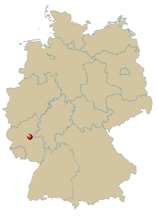
A map of modern Germany showing
Pleizenhausen
This site is a collation of descendants of Jacob Thomas of Pleizenhausen, Germany. He may be the son of intro_3= Franz Jost Thomas from the nearby town of Bergenhausen, although this is just a guess on the part of some researchers.
The information comes from various Thomas descendants, both in my line and others.
◊◊◊◊◊◊◊
Tracing the family line to Garret Thomas, who served in the American Revolution and was born in Germany, was fairly quick as he is documented in lineage society applications. I eventually found Gerhardt Thomas' name on the lists of passengers immigrating from Germany aboard the ship Phoenix, which established the immigration. There it sat for a time, stuck at the great genealogy wall that is the Atlantic Ocean. However, I came across some research on a Web site created by Rich Thomas. He notes that Professor Werner Hacker found German emigration records listing a Johann Peter, Johann Gerhard, and Anna Elisabeth Thomas who emigrated together from Simmern, Germany in 1754. I do not have a copy of Professor Hacker's book, but I'm taking it on faith that this record exists. Given the year and names (women's names weren't recorded in immigration records of those days), it seems almost certain to be a match to the individuals who arrived on the Phoenix. Rich Thomas' research goes on to make a rather convincing case tying these individuals to a family from Pleizenhausen. This town is a part of the collective municipality (Verbandsgemeinde) of Simmern in the Rhein-Hunsrück-Kreis district of Rhineland-Palatinate, Germany.
There are many reasons why the Thomas siblings might have emigrated. The Seven Years War, with quite a bit of forced conscription, was sweeping through Europe. An ancestor in another line from nearby Sprendlingen is supposed to have said he left Germany so that, "sons would not have to fight against their own countrymen to further the political aims of their rulers."
Another reason may have been economic. The economy during the 18th century was purely agrarian and all land was under cultivation. With the major wars of the early century over, prosperity was returning and families were growing. For many of those families, the available farmland simply could not support the numbers. Emigration became the reasonable solution.